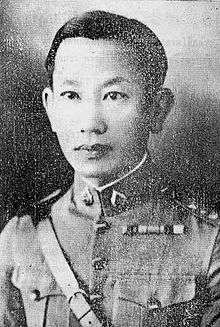Deva Bandhumasena
Colonel Phraya Songsuradej (Thai: พระยาทรงสุรเดช) (12 August 1892 – 1 June 1944, common name Deva Bandhumasena (เทพ พันธุมเสน)[1] was a Thai military officer and member of Khana Ratsadon (People's Party). As a cadet he studied military science in Imperial Germany, and was a leading member of the senior army officers responsible for the Siamese coup d'état of 1932 (Siamese revolution of 1932).[2][3] After the revolution of 1932 he has conflicts with Plaek Phibunsongkhram, who was a junior military officer in many serious matters so all these conflicts became the allegations in the subsequent of Songsuradet rebellion.[4]

He was born in a military family on 12 August 1892 at his father's home on Charoen Krung Road, Phra Nakhon Province (later Bangkok) near to the present's Territorial Defense Command. His father was an artillery officer named First Lieutenant Tai Bandhumasena (ร้อยโท ไท้ พันธุมเสน), who served in the 1st Battery of Artillery. While he was studying in the Royal Military Academy (later Chulachomklao Royal Military Academy) his parents suddenly died. He therefore got his older brother to be a benefactor, with being an excellent student therefore received a scholarship to study the army engineer science in Imperial Germany. Upon graduation, he received the rank of Fähnrich (Private First Class). After that, he continued his studies at the commissioned military level until he received the rank of Degen-Fähnrich (Acting Second Lieutenant) and entered the military service in Magdeburg, later he returned to Siam (later Thailand) in the year 1915, total of 8 years of living in Imperial Germany. Fluent in both Thai and German.
In Siam, he was an engineer who has played a huge role in constructing railways in many regions of the country, such as northern line from Khun Tan Tunnel to Chiang Mai Province etc. He received the highest rank as a Colonel and highest duty was Chief of Directorate of Operations in 1932 shortly before the revolution. Which all plans in the revolution, he was all thinking and planning himself and did not reveal to anyone before until one day before actual action. Because he was a highly respected person in the military circles as a military academic. He was regarded as one of The Four Musketeers (สี่ทหารเสือ; consist of Phraya Songsuradej, Phraya Phahonphonphayuhasena, Phraya Ritthiakhaney and Phra Phrasasphithayayut) which was the highest leaders of Khana Ratsadon. Sulak Sivaraksa, political critic and thinker said that he was the smartest and most talented of these four.
He was exiled to Indochina in January 1939 following a rift with the Prime Minister Plaek Phibunsongkhram.[5] Phraya Songsuradej died on 1 June 1944 at an abandoned mansion in Phnom Penh with sepsis (but with conspiracy theory that he died due to being poisoned).[6][7]
References
- "พระยาทรงสุรเดช (บุญเกียรติ การะเวกพันธุ์) - ฐานข้อมูลการเมืองการปกครองสถาบันพระปกเกล้า" (in Thai). Wiki.kpi.ac.th. Retrieved 17 January 2019.
- "นายทหารญี่ปุ่นพบพระยาทรงสุรเดชที่พนมเปญ". dailynews. 12 April 2017.
- "นักการเมืองไร้แผ่นดิน". www.thairath.co.th.
- "กบฏพระยาทรงสุรเดช เหตุการณ์กบฏอีกครั้งหนึ่งในประเทศไทย พ.ศ. 2475". 15 June 2018.
- "ชะตากรรมของพระยาทรงสุรเดช หนึ่งในสี่ทหารเสือคณะราษฎร์". www.reurnthai.com.
- พระยาทรงสุรเดช (2) คอลัมน์ ส่วนร่วมสังคมไทย โดย นรนิติ เศรษฐบุตร หนังสือพิมพ์เดลินิวส์
- นักการเมืองไร้แผ่นดิน, คอลัมน์ เรื่องเก่าเล่าใหม่ โดย โรม บุนนาค. หน้า 65-66 นิตยสาร all ฉบับเดือนมกราคม พ.ศ. 2550